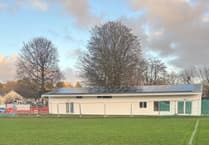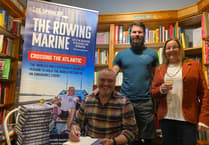OBITUARY: FRANK Greep was born in 1922 in Horrabridge, one of four sons of William and Ethel Greep. At 14 Frank started a five-year apprenticeship at Manor Garage, Horrabridge on two shillings and sixpence a week.
By the time he was 19, he was a pretty good troubleshooter with a motor. Later, he would build a few cars himself. Meanwhile, the young men of Horrabridge were off to war and he wanted to go with them.
After the square-bashing, he was assigned to minesweepers as a motor mechanic and sent on a crash course of accustomisation, including an intensive course, at Cobham, on the ways of 12-cylinder Alscot engines, known as Yankees. Aboard ship, he would be running two banks of two of these: meaning 48 cylinders to watch over, running on 100-octane aviation fuel; 48 spark plugs to change when required.
He got into action in the Channel late in 1942 and sailed into the thick of it daily, from Newhaven and Dover, ‘week after week, month after month’, often working from 5am until midnight, either in action or preparing for it.
Most of the sweepers would work together in a flotilla, sometimes assisted by observers in an American blimp, dragging cable-cutting trawls through enemy minefields, so the mines bobbed up and could be sunk or exploded by the gunners on a ship following up at the rear.
Sometimes the explosions were awfully close. Sometimes one took a minesweeper with it. But if you were lucky, you lived through a bit of a shake up and got as many buckets of fresh fish as you wanted afterwards.
The engine room’s first job was never to panic.Whatever was happening, they manned the lower deck, ready to climb around the hot engines, controlling revs and hauling on a big gear lever to change between forward and astern, to orders from the bridge.
By the time Frank got to sea he was a Killick, Navy slang for a Leading Seaman with trade skills. Within his first year in the service he was made Petty Officer and the NCO in charge of two stokers – named for the days when most of their job was shovelling coal.
Minesweeping was an endless round of gambling with the mines and with air attacks and Frank saw and heard enough to thank God for his own survival
As well as running and maintaining the main engines, he had to look after the steering mechanisms; the donkey engine used for pumping out the bilges; the fuelling at sea and the shipping of water; the hydraulics for the guns; the ship electricals, including a sofa-sized box of batteries which powered the Asdic sonar; and the rig of gas bottles, chemicals and pumps, at the stern, which would create a thick cloud of smoke, for camouflage, when required.
In March 1944, he married Margaret, known to all as Margie, who he had been seeing since 1938, when she was still 14 and new over from Cornwall to cook at one of the big houses on Roborough Down. By the time they married, she was serving as a WAAF and after four days leave for the wedding, they didn’t see each other again for two years.
He was due in Portsmouth and she had to go to Andover. They shared a train to a heartbreaking farewell at Eastleigh and the next day Frank was on a train to Liverpool for a troop ship to Egypt, to pick up a new ship, ML 867, in Alexandria. He was working around Greece when news of the D-Day landings in Normandy came through and was celebrated with an extra ration of rum.
Then it was back to work, on a diet which in those waters consisted mainly of dehydrated potato and cabbage, biscuit which would put a dent in a wall, egg powder, tinned hotdogs made of soy and not much else and tomato soup made by mixing tinned tomatoes with water. The odd bucket of fish as compensation for a near miss was particularly welcome then.
He came out of the Navy in 1946 and went back to the garage in Horrabridge, as foreman mechanic, until it was sold, in the early 70s. He moved to another garage, in Tavistock, but it went into liquidation. And for the first time in his life, he was out of work. There was a chance of work in Devonport dockyards but it meant joining a long queue. When he got to the end of it, he met three officers who told him they liked to employ Navy veterans and could get him into the yard if he could find his discharge papers, with that all-important character reference. He was sure they were lost and he got home disconsolate. But Margie was the sort of housewife who could lay her hands on the papers in five minutes.
Frank went back to the Navy panel and was told he could have a pass but it was up to him to find a job and get approved for it by the unions. He had been sweeping floors for two months when a supervisor came over to ask him a few questions.
At 54, he became an apprentice again and spent four years learning to use a couple of dozen and more different machines for shaping steel. Although theoretically he was on an apprentice’s wage, the men on piece work quickly started cutting him in for a bit of production in their names, and he earned enough to support his family until he was formally qualified.
He became central to another war effort in 1982, when civilian ships commandeered for the Falklands had to be made war-ready and the fabricators of Plymouth were working around the clock in 12-hour shifts, seven days a week.
He worked on until he was 64 and his eyesight was failing. After that, he continued to run his locally famous garden at 20 Fillace Park and fill a cabinet full of trophies from local shows. After his wife fell ill, they moved to a sheltered bungalow at Yelverton, where she died at Christmas 2009. They had been married for 66 years and sweethearts for 70 years.
He had two children, Tony, born 1947, and Carol, born 1950, who have given him five grandchildren and eight great-grandchildren.
France announced in 2014 that it wanted to award Frank its highest honour ‘Legion d’Honneur’, for his part in the liberation of their country towards the end of World War 2. It was given to all surviving servicemen who were involved in the preparations for the big push, even if they were not part of the landing. They would all be 90 or more but thousands applied. Frank, probably the last of his generation in his home village, was one of the last batch of 1,400 applicants to be approved, after his case was presented by his local Combined Services Organisation, representing Horrabridge’s many younger service veterans.
Frank received two commendation certificates for ‘courage, keenness and skill in a dangerous and valuable minesweeping operation’. The first was for the Channel operation leading up to D-Day and the second for his work around Crete, Piraeus, Salonika, Malta, Sicily and Italy, while the war played out afterwards.
Throughout his time at war, Frank Greep carried a Bible presented to him by the Horrabridge Methodist chapel youth club when he joined up. Some of the signatures in it were written by friends who followed him into the war but never came back.
Frank, aged 100, was living independently at the retirement complex Briar Tor, Yelverton until a few weeks before he died. His funeral will be held at Efford Crematorium in Plymouth on Friday, March 17 and his coffin will be carried by members of the Royal Marines.





Comments
This article has no comments yet. Be the first to leave a comment.